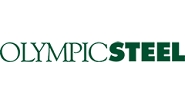Market Segment

February 22, 2020
Olympic Reports Lower Sales, Earnings in 2019
Written by Sandy Williams
Olympic Steel missed its mark during a challenging year. The company reported net income of $3.9 million for 2019, down from $33.8 million in 2018. Net sales fell 8.3 percent year-over-year to $1.6 billion.
Fourth-quarter sales slid 29 percent from a year ago to $320 million. The company posted a net loss of $890,000 in Q4 2019 compared to a loss of $1.3 million in Q4 2018.
“2019 was a year of progress for Olympic Steel in a challenging environment that saw carbon steel prices under extreme pressure after the 2018 run-up in prices,” said CEO Rick Marabito. “Supporting our large OEMs fueled significant growth in our Carbon Flat products segment during the trade and tariff-induced market of 2018. Our carbon segment then felt the fourth quarter 2019 impact of those OEMs downsizing their inventories as carbon pricing plummeted and demand waned.”
The company’s Specialty Metals division was a bright spot for Olympic, achieving its second most profitable year in the company’s history. Chicago Tube and Iron had its third most profitable year since its acquisition by Olympic in 2011. Together, Specialty Metals and Pipe & Tube comprise 41 percent of net sales, up from 37 percent in 2018.
Results from manufacturing acquisitions have proven beneficial to Olympic’s bottom line, and the company plans to move forward with more downstream acquisitions as opportunities arise.
Said President and COO Andrew Greiff, “Overall, we remain optimistic, but cautious in our outlook and mindful of the uncertainty that exists. We do know that new carbon steel producing capacity will be coming online over the next 12 to 24 months, which will likely pressure pricing for our carbon flat products. We continue to address the volatility associated with these uncertainties by reducing risk through lower inventory levels and increasing our transactional or spot business.”
Carbon sales are expected to be flat in the first quarter, but with some growth in specialty metals on a year-over-year basis.
Regarding volatility in the carbon sector, Olympic is working to add more value to its carbon steel division through acquisitions and internal processing as well as controlling expenses and inventory turnover.
“A big piece of that volatility is the obvious swings we see in the market pricing,” said CFO Rich Manson. “I think 2018 and 2019 were perfect evidence of that. We’re intensely focused on making sure that we’re turning our inventory faster, and we’re trying to keep our inventory closer to the market. We had some good success doing that in 2019 and we’re certainly focused on improving that going into 2020. We turned our inventory 4.6 or 4.7 times in carbon in 2019, and we’re pushing to the goal of five times.”
When asked about trade policy with China, Marabito said there has been some shift by customers to make more products in the U.S. “It probably started two or three years ago,” he said. “We have not seen a greater push since that time, but we certainly have been the recipient of manufacturing being shifted back to the U.S. from our large industrial OEMs. At this point, they’re just kind of maintaining where they’re at.”







